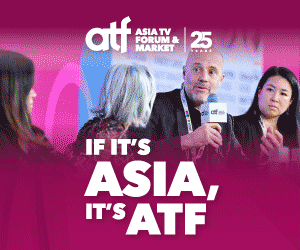
German programmer DW Transtel has spent the whole year celebrating its golden anniversary. Now, with the string of 1960s-themed parties coming to an end, the company is moving into its future in Asia with a commitment to “fill the gaps that Asian producers do not produce themselves,” says Petra Schneider, Deutsche Welle’s (DW) director of sales and distribution.
“The goal is for DW Transtel to provide content that does not compete with local production budgets, but complement what they need,” Schneider says.
That’s now. Back in 1965, when Transtel was founded, “international television was still an adventure,” she says. Early programming included German football – “you can’t be a German content provider without football,” Schneider says – as well as a game show called Telematch, a 1960’s tongue-in-cheek competition show that Schneider says put Transtel on the map and, “showed Germans didn’t take themselves quite so seriously”.
In the 50 years since, DW Transtel has narrowed its focus significantly, with a concentration on science programming and documentaries. The company currently offers 1,100 hours of science programming. The 25 titles include Great Moments in Science and Technology, Science Workshop and Quest for Knowledge. DW Transtel offers about 150 documentaries a year, making it one of Europe’s largest docu providers.
A more recent programming addition is European culture and lifestyle series Euromaxx, along with spin-offs in design, architecture, food and travel. Local versions have been co-produced in China and with VTV in Vietnam. Euromaxx now airs in 52 countries on more than 75 channels.
The biggest changes to DW Transtel’s business over the years have been the switch to digital and the ongoing need to adapt German content for international audiences.
With a portfolio of more than 5,000 hours in up to five languages, the switch to digital was massive and, Schneider says, an important one in order to react more quickly to customer’s wishes.
Technology has driven the biggest change in the Asia business. “The way Asia’s young audiences consume content has definitely affected the...
German programmer DW Transtel has spent the whole year celebrating its golden anniversary. Now, with the string of 1960s-themed parties coming to an end, the company is moving into its future in Asia with a commitment to “fill the gaps that Asian producers do not produce themselves,” says Petra Schneider, Deutsche Welle’s (DW) director of sales and distribution.
“The goal is for DW Transtel to provide content that does not compete with local production budgets, but complement what they need,” Schneider says.
That’s now. Back in 1965, when Transtel was founded, “international television was still an adventure,” she says. Early programming included German football – “you can’t be a German content provider without football,” Schneider says – as well as a game show called Telematch, a 1960’s tongue-in-cheek competition show that Schneider says put Transtel on the map and, “showed Germans didn’t take themselves quite so seriously”.
In the 50 years since, DW Transtel has narrowed its focus significantly, with a concentration on science programming and documentaries. The company currently offers 1,100 hours of science programming. The 25 titles include Great Moments in Science and Technology, Science Workshop and Quest for Knowledge. DW Transtel offers about 150 documentaries a year, making it one of Europe’s largest docu providers.
A more recent programming addition is European culture and lifestyle series Euromaxx, along with spin-offs in design, architecture, food and travel. Local versions have been co-produced in China and with VTV in Vietnam. Euromaxx now airs in 52 countries on more than 75 channels.
The biggest changes to DW Transtel’s business over the years have been the switch to digital and the ongoing need to adapt German content for international audiences.
With a portfolio of more than 5,000 hours in up to five languages, the switch to digital was massive and, Schneider says, an important one in order to react more quickly to customer’s wishes.
Technology has driven the biggest change in the Asia business. “The way Asia’s young audiences consume content has definitely affected the way syndication models work for DW Transtel,” Schneider says, adding that non-linear rights are now the expectation.
DW Transtel has also been impacted by rising levels of local production. “Most, if not all markets, are rushing forward with local productions and standard packaged syndication productions have become less attractive as trends move towards scripted formats,” Schneider says.
Media environments on the ground are also shifting. “More broadcast licenses have been awarded in recent years, affecting the way we develop our commercial terms in competitive territories such as Thailand, Hong Kong and Vietnam,” Schneider says.
DW Transtel’s biggest challenge going forward is “the ability to invest and produce content that stays relevant in large markets that are typically non-homogenous. That applies to Asia, but especially for the rest of the world”.
Moving into the future, she says DW Transtel’s mix of content from DW and other German producers and public broadcasters means constantly looking for the right balance between, “producing relevant content at the proper price for our syndication business”.
Challenges in Asia vary. In emerging markets, low license fees and a desire for content from recognisable brands is a challenge, says Schneider, while in places such as China, “government policies and politics affect our popularity”.
The Asia strategy is to fill gaps in Asia schedules. Schneider says DW Transtel’s content “will not compete with local production budgets, but complement what [broadcasters] need but do not produce themselves. This is typically content that we inherently do better because of where and who we are as a brand”.
This article originally appeared in ContentAsia's eNewsletter issue 219 published on 19 October 2015.



















